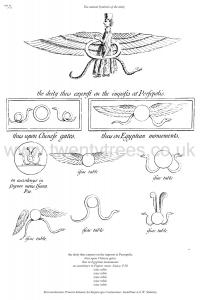Avebury Chapter XIII
Avebury Chapter XIII is in Avebury A Temple of British Druids, With Some Others, Described by William Stukeley.
Hercules of Tyre, part of his history. Was a pastor king in Egypt. Retired thence with 240000 men, about the latter end of Abraham's time. The chronology of those pastor kings fixed, somewhat more accurately than in Usher and Cumberland. Hercules king in Egypt, or the Pharaoh with whom Abraham conversed there. He was a very great navigator: a learned prince, an astronomer, a chronologer. The Hercules Ogmius. What the word means. He knew the secret of alphabet writing, and the true length of the solar year. He learned probably of Abraham. He carried colonies about the Mediterranean, and into the Ocean, and brought the Druids into Britain. He built many patriarchal temples; some of serpentine form: particularly at Acon in Palestine. He had a son called Isaac. The evidences of Hercules planting Britain. Of Apher his companion, grandson of Abraham, giving name to Britain. Remains of Hercules his people, called Hycsi, in Britain. Hence we conclude our Druids had the use of Writing before Cadmus carried it into Greece.
NOT much later in time than Phut, lived that other celebrated hero of antiquity, the Egyptian, Phœnician, Tyrian Hercules; whom I take to be a principal planter of Britain. He was of Phœnician extract, born in Egypt and king there, founder of Tyre, and the most famous navigator: the first that passed thro' the Mediterranean, and ventured into the great Ocean. I have wrote his history copiously, from which I must recite some deductions only, useful to our present purpose.
Hercules called Melcartus, was son of Demaroon, as Sanchoniathon the Phœnician writer informs us. Demaroon was intituled Zeus, whence the Greeks made Hercules the son of Jupiter. Demaroon according to our Phœnician author, was son of Dagon or Siton son of Ouranus (who in truth is Noah) and begat after the flood, but it was not his business to mention the flood. Hercules then may reasonably be supposed to live to the same age as Noah's other great grandsons; if we say grandsons, it alters not the case. We need not be concerned at the seeming great distance between Hercules in the genealogy and Apher: for from Sanchoniathon we may prove that Melchisedec was Arphaxad. He conversed with Abraham.
Josephus in his first book against Apion has preserved a valuable and venerable piece of antiquity, called Manethon, the Egyptians' Dynasties. This has given the learned much entertainment. I have considered it too with attention, in what I have wrote concerning the Mosaick chronology. I shall here recite some conclusions from it, for my present purpose.
Table XXXVI. A Brittish bridle. A Brittish Urn. Chyndonax' Urn. DM Roberti Halford Mit. Caroli Tucker Ar. De Antiquitatibus Alburiensibus optime meritis ex voto posuit l. m. q. W. Stukeley.
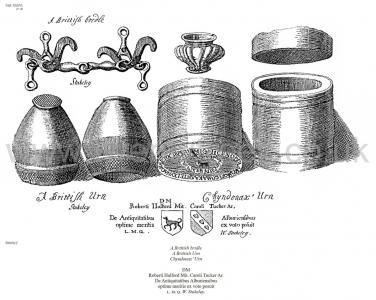
The dynasty of the pastor kings is what we are chiefly concerned in, which belongs to the most early ages after the flood. Sir John Marsham has set them too low. Bishop Usher and Cumberland are much nearer the truth, as I apprehend, and from whom I differ very little. The last of this dynasty of pastors is Assis, Archles, our Egyptian Hercules. They were Canaanites that followed Misraim into Egypt, and at first lived very peaceably, but in time the two families quarreled, and waged terrible wars together, for 200 years. The Misraimites possessed the upper regions of the Nile, Canaanites the lower or marshy part upon the Mediterranean sea, called Delta. Hence the former called 'em Titans, i. e. dirty, fenmen, bog-trotters, as we say contemptuously, of a people who are their real descendants. The Misraimites called themselves the Elohim, or Gods, descendants of Ilus or Cham, and that lived, as it were, in a heavenly region, toward Egyptian Ethiopia, where Homer makes the gods to hold their festivals. So the Greeks called such as lived in the high countries, Athamanes, heavenly. Mount Olympus was heaven, the habitation of the gods. This was the way of talking in the heroical times.
The Canaanites, on the other hand, called themselves Hycsi, or royal pastors. And the stories of the battles between these two people are the oldest stories we have among the poets, when they ring about the wars between the gods and the Titans.
In the chronology of this pastor dynasty, I differ a little from the great authors aforementioned. The chief reason why, is this. They take the numbers in Josephus's catalogue, as in the present copies; but I hold 'em erroneous, and to be corrected from Africanus, Eusebius, and Syncellus, who copied from Josephus in earlier times. Josephus's present numbers are somewhat too short: for tho' Africanus, Eusebius, and Syncellus differ from one another, as well as from Josephus, (such is the misfortune of negligence in transcription) yet they all agree to heighten the numbers. And Josephus himself, twice in the same books, makes the sum total to be 393 years, which is more than his particulars, by which Marsham, Usher, and Cumberland go. But take that sum total 393, and set it at the exodus, and count upwards: I apprehend then we have it in its right situation.
By this means, the head of the pastor dynasty in Egypt, which commenced with Salatis, must be placed anno mundi 1860 instead of 1920, as Usher and Cumberland have it: and during the reign of Menes, Misraim, Osiris, according to their own chronology. This, I am confident, is near the truth. And thus that dynasty is to be placed in the list of time.
Manethon's dynasties of pastor kings in lower Egypt.
Salatis began to reign A. P. J. 2570. A.M. 1860
Beon 1879
Apachnas 1923
Apophis 1959
Janias Staan A.P.J.2020
Assis, Archles, Melcartus 2781 2071
By this means we have an opening scene of the greatest matters of antiquity, that relate to the world in general, as well as particularly to the island of Great Britain; of which I must give some account.
In the year of the world 2083, the great patriarch Abraham came out of Chaldea into the land of Canaan. This is in the 13th year of the reign of our Melcarthus in lower Egypt. About 2087, not 2084 (as Usher sets it) Abraham, by famine constrained, goes down to Egypt, that is, into lower Egypt. So that our Melcarthus is the real Pharaoh mentioned Gen. xii. who would have taken Sarah, Abraham's wife, 'till he learned the truth. Usher, at the year 2084, calls him Apophis; but 'tis an error of the pen, it means Janias, predecessor to Assis, whom he sets as regent from anno mundi 2081. Castor the chronographer, in Syncellus, writes, "that Abraham was well learned in the knowledge of astronomy, and the other sciences of the Chaldeans." Berosus, author of the Chaldean history, gave him the character of "a just and great man, expert in astronomy." Josephus adds, "that Hecateus had such a value for his memory, that he wrote his history." Nicholas of Damascus an historian, and Trogus, make him a king. Alexander Polyhistor relates from Eupolomus, "that Abraham exceeded all men in wisdom; that astronomy was founded by him among the Chaldeans; that he came into Phœnicia, and taught the Phœnicians astronomy; that he being constrained by famine, went into Egypt, lived in Eliopolis among the priests, and taught them astronomy; yet he did not pretend to be the inventor of the art, but had it delivered to him by succession from Enoch." Artapanus likewise, the historian, mentioned by Eusebius præp. evang. IX. 4. he speaks of "Abraham going to the king of Egypt, and teaching him astronomy, and that after twenty years he returned into Syria." Melo, another old heathen author, speaks much of Abraham's wisdom. These writers, as wholly disinterested, sufficiently shew that Egypt hence learned astronomy, and Melcarthus their king in particular.
It seems, at this time, the major part of the world, thro' ignorance or negligence, knew not the true length of a year, making it of 360 days only. But Abraham taught the Egyptians better; for now we may understand that remark in Syncellus, that under Assis or Hercules, the last of the pastor kings, the 5 additional days were placed in their year. And then a solar year of 365 days first began among the Egyptians. 'Tis somewhat odd, that the Egyptians should call these 5 additional days by the word Nesi, which signifies a snake. I suppose they meant by it sacred days, holy days. They were placed at the end of the year, and reckoned birth-days of the gods, I suppose from some fore-notices they had of the birth of Messiah at that time of the year; for I find all antiquity had such notice. But Syncellus does not tell us the whole of the truth: Abraham taught Assis likewise the intercalation of the quarter-day, and the leap-day every fourth year. For, according to what I have been able to see concerning this matter, the Mosaic or patriarchal year was solar, and strictly Julian. But when the world was o'erwhelmed with idolatry, providence judged proper to alter the year too, in order to dislocate their heathenish and superstitious festivals. Therefore to Moses God communicated the form of the lunæ-solar year, which the Jews use to this day. But toward the advent of Messiah, providence took care to restore the ancient patriarchal year, in the Julian form.
Hence we may account for what Herodotus tells us of the Thebans, a people in upper Egypt, who intercalate the quarter-day every fourth year: from the earliest times, no doubt from the time of Hercules.
Let us mention this remark. In the sacred account of Abraham's sojourning here in Egypt, we meet with no distaste of the Egyptians to shepherds, which in his grandson Jacob's time was an abomination to them. This shews that the pastor kings now reigned here, with whom Abraham conversed; and it shews the reason of that abomination, when they were expelled; it confirms this history of Manethon's dynasty, and illustrates the scriptures. Jacob's family being Canaanites and shepherds, were taken to be of those that held the Egyptians in so long a war. They were pretended to be spies by Joseph, Gen. xlii. 9.
Table XXXVII. Kist vaen In Cornwal, In Cornwal, In Monkton field [Map] by Abury
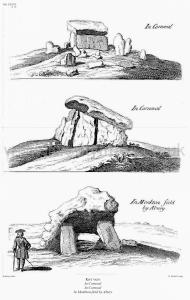
Further, we have another very important piece of history from Abraham's being in Egypt, which the learned are not aware of; for hence 'tis more than presumption, that the Egyptians learned the use of letters or alphabet-writing. If we seek into the accounts transmitted to us by letters, concerning their own origin, Philo the Jew expressly attributes the invention thereof to Abraham. Whence Plato in Philebo and in Phædro, contends for their first appearance in Egypt, discovered by Theut, "who, whether he be a god, or a man, is doubtful," says he; meaning, the use of them must be a divine communication. Syncellus writes, "the opinion of some is, that Abraham brought letters out of Chaldea, and taught them to the Phœnicians, and they taught them to the Greeks." Diodorus V. writes, "the Syrians invented letters, and the Phœnicians learned the great secret from them." Eusebius, pr. ev. X. confirms this, but asserts, "that by the Syrians are meant the Assyrians (as was often the case in old accounts) or the Hebrews more particularly." It was, in truth, the ancestors of Abraham. And this I believe is the real truth. God first imparted this knowledge to the patriarchal family, for preserving the sacred records of his church; and Abraham now taught their use to Assis, the Hercules, son of Nilus Jupiter, who wrote in the Phrygian letters, says Cicero.
All this is exceedingly confirmed by the explication which Mr. Toland gives us concerning Hercules Ogmius, in his history of the Druids. Lucian says, 'tis a word of their own language, by which the Celts call Hercules. And the word has hitherto been inexplicable. He relates the picture of him (in Hercule Gallico) which he saw in Gaul, which was explained to him by a Druid. He was pictured as clad with a lion's skin, a club in his right hand, a bent bow in his left, a quiver hanging o'er his shoulders. As for his form, he was an old man, bald before, wrinkled, and in colour like a sun-burnt sailor. A multitude of people were represented as drawn after him by golden chains from their ears, centered in his tongue. The Druid told Lucian, that Ogmius accomplished his great atchievements by his eloquence, and reduced the people of this western world, from rude and barbarous to a state of civility.
A memorial of this knowledge which Hercules had of letters, we find in Hephæstion V. where he writes, "Hercules gave the name of Alpha to the first letter, in honour to the river Alpheus, when victor at the olympic games." My late learned friend, Mr. Keysler, in his Antiq. septentrional. guessed well that Ogmius means literatus, a man of letters, as we commonly say; more properly spoken of Hercules than of others. But Mr. Toland shews evidently, that Ogum is a word in the Irish language, importing the secret of alphabet writing; the literarum secreta, as Tacitus calls it, de mor. germ. So that Hercules Ogmius fully imports the learned Hercules, and especially one that was master of alphabet writing; without which learning is but a vague and uncertain thing. This our Hercules learned of Abraham in the east, and this he brought with our Druids into the extremest west, in this very early age of the world, as we have all the reason imaginable to believe. That they had letters, we have Cæsar's express testimony, and they were the same as the greek letters, because the very same. They had them from the same fountain as the Grecians, tho' somewhat earlier; for I take our Hercules to be a little prior in time to Cadmus, who carryed letters into Greece.
Hercules therefore was learned and eloquent, a great astronomer, and philosopher. A fragment of Palæphatus in the Alexandrian chronicle, calls him the Tyrian philosopher, who found out the purple dye: Suidas in the word Hercules, the like. And long before, Heraclitus in Allegoriis Homericis, says, he was a wise man, a great philosopher, και σοφιας ουρανιου Μυστης, one initiated into the wisdom from above; we may call him a professor of divinity.
Thus he appears a worthy scholar of the great Abraham, and from him the Druids learned the groundwork of learning, religion, and philosophy, which they were so famous for ever after. But my purpose is to be very short on this head at present: nevertheless I must remark that our Assis was not only acquainted with Abraham in Egypt, but likewise in the land of Canaan or Phœnicia; for he quitted Egypt by compact with Tethmosis A.M. 2120, carrying away with him 240000 men, which enabled him to transport colonies all over the Mediterranean and the ocean. And he must dwell several years in Canaan before his projects of that kind were ripe. But Abraham dyed A.M. 2183, so that there was abundantly time enough for the two great men to renew their acquaintance, and there is much reason to think they actually did so.
Therefore as it was the patriarchal custom to raise temples wherever they came; so of our hero Hercules, whether thro' his own pious disposition,or in imitation of Abraham: we hear of his raising pillars too, which means our temples. And thence he obtained the name in antiquity, of Hercules Saxanus.
Thus the learned Lud. Vives on St. Augustin C. D. viii. 9. "The philosophy of the Egyptians is very ancient, but for the most part derived from the Chaldeans, especially from Abraham, tho' they, as Diodorus writes, refer it to Isis, Osiris, Vulcan, Mercury, and Hercules." Further from Joseph's administration, the Egyptian learning commenced, for which they became so celebrated. He not only instructed the priests in religion and philosophy, but settled their colleges and possessions, as we read in Gen. xlvii. 22, 26. so that if Moses was learned in the wisdom of the Egyptians, he derived it only thro' them from his own ancestors. Which note may be useful to give us a true notion of this matter, which some learned men exalt too high. And this at the same time shews idolatry commenced in Egypt, after his time. They consecrated Joseph into the genius or intelligence of their first monarch Osiris, Serapis, &c. with the bushel on his head. But what I chiefly insist upon at present, is of Hercules making these serpentine temples, which in his history is called overcoming serpents and the like. And hence the fable of his squeezing two serpents to death in his cradle; and the Tyrian coins struck to his honour, some whereof I have exhibited.
Table XXXVIII. The alate Temple of the Druids at Barrow in Lincolnshire, on the banks of the Humber.
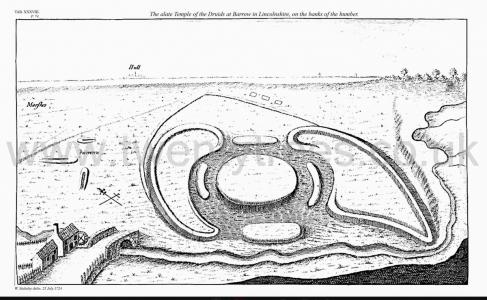
I. A coin in Vaillant's colonies II. p. 148, 218, 340, 351. Of the city of Tyre, an olive-tree with a snake between two stones, petræ ambrosiæ. An altar; and a conch, meaning Tyre.
II. A coin in Vaillant's colony coins II. p. 314, struck at Ptolemais or Acon. A great and rude stone altar without any mouldings or carvings, between two serpents, a Caduceus which is truly the ophio-cyclo-pterygomorph on a staff meaning in the hieroglyphick doctrine, the power of the deity. These imperial coins of colonies intended to preserve the memory of their antiquities, and this probably regards the old serpentine temple in the foundation of their city Acon or Ptolemais.
III. A coin in Vaillant's colonies II. p. 111, struck at Berytus. They all regard Hercules's building serpentine temples.
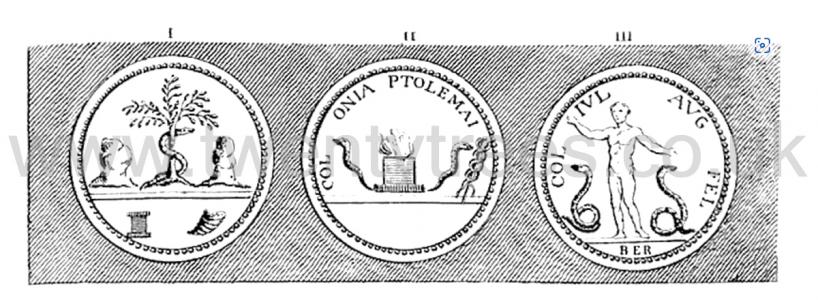
Of his building our Druid temples in general, of these great stones, the two coins of Gordian in Stonehenge page 50, are a further evidence. The Ambrosiæ Petræ are a work of this sort, when he began or assisted in building the city Tyre. And I gather he was a great builder of serpentine temples in particular, such as we have been describing, called Dracontia. What he did of this sort in Britain I have no foundation for discovering; but in ancient history still left us, there are sufficient traces that shew he did it, in the more eastern parts of the world.
For instance, at Acon or Ptolemais as called afterward, a city on the Phœnician shore: it regained its first name and now is called St. John of Acres, from a famous church there. The first city was probably built by our Hercules, at least he made one of these temples there, as I gather from the name of the place, coins and reports relating thereto. The Greeks call it Ακη, and according to their custom, give it a Greek original, from ακεισθαι, because says the Etymologicum magnum, Hercules was there healed of the bite of a serpent. Stephanus of Byzance the same, in the word Ptolemais; in the word Ake, he says, that Claudius Julius in his vol. I. of the Phœnician history, writes, "that it had its name from Hercules, who was ordered by the oracle to go eastward, 'till he came to a river, and found the herb Colocasia, which would cure his wound. He came to the river Belus, which here runs into the sea, and there found the herb." Salmasius in his Plinian exercitations, affirms, the herb is Dracunculus; it grows in our gardens, called Dragons, from its likeness to a snake's head and tongue; and being spotted like a snake.
All this I can understand no otherwise, than that Hercules made a serpentine temple on the side of this river, where the city Acon was afterward built, and which took its name from this temple, as our Hakpen at Abury; for עכן Acan in the Chaldee, signifies a serpent, as we observed before. Josephus informs us, by the river Belus was the sepulchre of Memnon; which probably was made here in regard to the temple.
When we come into Greece, we hear of Hercules overcoming the Lernean snake, which Heraclides Ponticus writes had 50 heads. We may very well understand this of 50 stones, which composed the head, as our temple on Overton-hill of 58. Hephæstion II. recites from Alexander the Myndian, that this Hydra was turned into stone. Thus hints and reports are droped, which preserve the real truth inveloped in fable; as was the Greek method in all matters of antiquity.
This snake was of a very unusual bulk, and lay near a great water, called the Lernean-lake, by a large plane-tree, and the spring Anymone. Further 'tis said, in overcoming this animal (by which they mean the labour he bestowed in accomplishing the work) he used the help of Iolaus the waggoner. Such help must be highly useful to him, to bring the stones. But I observe from the name Iolaus his waggoner and companion, and Hylas another great friend of his, and Iole his mistress, that the ancient druidical festival is couched under that name, called Yule, which I shall speak largely upon in its proper place. In the mean time (we are told) the snake was assisted against him, by a very great crab. This will appear strange, 'till we are directed to its meaning by this consideration. As the serpent means the Dracontian temple, so the crab was a symbol like in figure and meaning to the globus alatus or winged circle, which was the ancient picture of the anima mundi, or divine spirit. Thus does mythology, when rightly considered, help us in these ancient enquiries. We may say of the work as Statius does of the temple of Hercules Surrentinus,
——Deus obluctantia saxa [God struggling rocks]
Summovit nitens, & magno pectore montem [He lifted up the mountain shining, and with his great breast]
Repulit. [Repulsed] ———
There are like vestiges of other Dracontian temples founded by Hercules in Spain, Africa, and elsewhere.
"Hercules," says bishop Cumberland, "was a very learned prince, bred or conversant in the Phœnician universities, whereof Debir was one, Josh. xv. 15. 49. called for its eminence, Kirjath-sepher, the city of books; and Kirjath-sanna, the city of learning." The bishop thinks he retreated from Egypt about the time of Abraham's death. But, from what chronological evidence I gave before, it must be a good while before it. And I do not doubt but he with pleasure renewed his acquaintance with his old friend Abraham, in the land of Canaan.
There seems to be a very pregnant proof of this, in that Hercules had a son called Isaac, to whom one would imagine Abraham was sponsor at his baptism, or perhaps his son Isaac; for baptism was one part of the patriarchal religion. And they had susceptors, sponsors, or what we call god-fathers at the font, as we have. Of this Isaac son of Hercules, Plutarch informs us, de Isid. & Osir. remembred by the Phrygians, for he was planted in Phrygia by his father Hercules. Hence it became a common name there, and Æsacus son of king Priam is but the same name, as my learned friend Mr. Baxter thinks, in his glossar. Antiq. Rom. If this consideration be joined to what I wrote in Stonehenge about Phryxus, or Apher, grandson of Abraham, having a concern in planting, and even naming of Britain, it 77may afford us another hint about our Phrygian extract, which the old Britons are so fond of. And we can expect no other than these kind of hints, in matters of such extreme antiquity. And further, as he was concerned in settling colonies in Spain, we may attribute to him the claim which the Gallæci there had, to a Trojan descent, of which Justin informs us.
Prospect of the British Temple at Barrow Lincolnshr July 25. 1724.
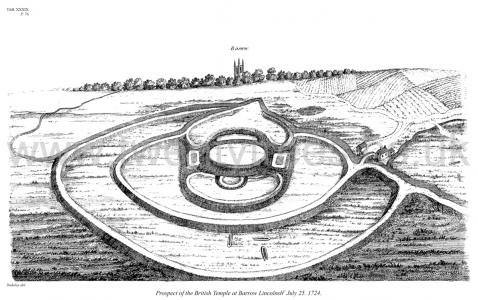
This Apher is the Africus mentioned by Mela, I. 9. He calls him an Arabian king, who being driven out by the Assyrians, went into Africa. 'Tis very remarkable, that his name, when interpreted, signifies Tyn; as the great Bochart makes the name of Britain, come from Bratanac, the land of tyn; equivalent to the greek word κασσιτερος, whence Cassiterides in latin. This expulsion seems to be hinted at in Gen. xiv. 6. in the days of Abraham. Now a reader not much acquainted with these kind of inquiries, will be apt to smile at pretending to a similitude between Apher and Britain. So in making the Wiltshire word sarsens derived from the same word as the name of the city of Tyre; tho' 'tis an undeniable fact, and easily perceived by the learned.
The evidences of Hercules planting Britain, are of the like nature, which I shall very briefly recapitulate. Apollodorus in II. after the story of Hercules, Antæus and Geryon, two kings in Afric and Spain, mentions his conquering Alebion and Dercynus sons of Neptune, in the same mythologic strain as the others, because they attempted to drive away his oxen. He makes it to be in Libya, others in Ligya or Liguria, others in Gaul. The variety of places is of no consequence in these very old stories. I regard only the personal names of Albion and Bergion, as more commonly called, sons of Neptune. If this be really so, sons of Tarshish, son of Javan: for Tarshish was the true Neptune of the heathen; and he was one of the sons to whom the heathen generally attribute the plantation of islands, as well as Moses, Gen. x. 5. But Albion and Bergion are notoriously most ancient names of Britain and Ireland. Mela, II. 5. mentions Hercules fighting Albion and Bergion. So Tzetzes in chiliad. and Tzetzes the interpreter of Lycophron.
Tacitus says expressly Hercules was in Germany, in that part lying upon the ocean especially. Ammianus Marcellinus, in his XV. 9. tells us from Timagenes, an ancient historian, "that the Dorienses following the more ancient Hercules, inhabited the western countries bordering on the ocean." By mount Carmel was a city Dora spoken of by Josephus, and by Stephanus of Byzantium, quoting Hecatæus, and many more old authors. See the famous fragment of Stephanus. Claudius Julius, in his III. of the Phœnician history, writes, "next to Cæsarea is Dora, inhabited by Phœnicians on account of the great quantity of the purple fish there found." Now Hercules being confessedly the inventor of this Tyrian dye, 'tis probable the companions of his, mentioned by Ammianus, were of this city.
If Hercules peopled the ocean, coasts of Gaul, Spain and Germany, we may well imagine he would do the like in Britain. Pliny's testimony is express, that Melcarthus (corruptly Midacritus) first brought tyn from the Cassiterid islands, which can be no other than Britain.
The poets and mythologists, when speaking of the Titans, agree they went all into the west, which seems to be meant of Hercules and his people settling in Britain. Our Thule, or northern island, seems to have been named by our Hercules, as a demonstration of his being there, from an island of the same name in the Persian gulph. Of which Bochart.
The like is to be inferred from such stories as that related by Parthenius78 Nicæus, "that Hercules travelling, after his expedition against Geryon, passed thro' the country of the Celts, and was entertained by Britannus. His daughter Celtine fell in love with him, on whom he begat a son called Celtus; from him afterwards the people of the Celts received their denomination."
We took notice before, that these shepherds who quitted Egypt under the conduct of our Hercules, called themselves Hycsi, as Manethon informs us in Josephus & Eusebius in chronol. The word imports royal shepherds, valiant, freemen, heroes. Now we find the remains of this very name in the south-western part of our island, in Worcestershire, even to the Roman times, and still further, even to the time of venerable Bede. They were called Huiccii, to which Orduices and Vigornienses is synonymous. And all three words mean the same thing, as the great Baxter shews in his glossary, Antiq. Britan. voce Orduices, Iceni, Huiccii, &c. And by all accounts our old Britons loved that same free, shepherd's life, which the old Canaanites did about Abraham's time, as described in scripture. Bishop Cumberland is elaborate upon it.
I take the Irish, and ancient highland Scots, to be the remains of the original Phœnician colony. My learned friend, Dr. Pocock, when he was in Ireland, observed a surprizing conformity between the present Irish and the Egyptians, and that in very many instances.
These considerations, added to what I said in Stonehenge, are enough to persuade us, that our Hercules had a considerable hand in peopling Britain.
Table XL. The antient Symbols of the deity. the deity thus exprest on the imposts at Persepolis. thus upon Chinese gates. thus in Egyptian monuments. on asardonyx in Pignor. mens. Isiaca. P.20. isiac table. isiac table. isiac table. isiac table. isiac table. Reverendissimo Prœsuli Iohanni Archiepiscopo Cantuarensi. humillime d.d. W. Stukeley.
